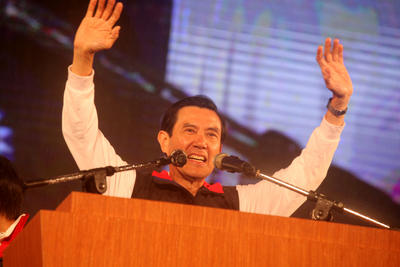But this reduced double victory may intensify the double challenge facing Ma and the KMT in his second and final term. As with most incumbents, Ma ran on his first-term record, and particularly his success in calming cross-strait tensions and maintaining Taiwan’s minimal ‘international space’. He achieved this by forging more cooperative relations with China and negotiating cross-strait economic agreements; just as closer economic ties with China have helped Australia ride out the last four years of global turbulence, so it is for the smaller, export-oriented economy of Taiwan.
After eight years of cross-strait tensions under President Chen Shui-bian and the Democratic Progressive Party (DPP), Beijing played along with Ma’s ‘economics-first’ approach to cross-strait relations in the hope that closer economic integration would shift the focus of Taiwan’s interests and politics — which have so far precluded any Taiwanese interest in discussing political agreements with China beyond the vague and disputed 1992 consensus. Beijing also stayed quiet on the lack of progress on Ma’s 2008 campaign promise to negotiate a cross-strait peace agreement, and gave Taiwan some minor wins in expanding its international space.
It is not clear though whether Beijing will be as patient in Ma’s second term, and it may push harder for political discussions. China is not interested in only establishing closer cross-strait economic ties and maintaining the political status quo of separation, even if these are what the Taiwanese want. Many in China believe that Beijing offered Ma and the KMT numerous economic and international diplomatic benefits in his first term, and are frustrated that this has not led to any real progress on political discussions.
Yet, the DPP’s improved performance in 2012 means that it will likely be more difficult for Ma and the KMT to move on political discussions despite pressure from Beijing. Ma’s ‘economics-first’ cross-strait policy may become an ‘economics-only’ cross-strait policy in his second term. The DPP has long predicted that closer economic ties with China will in time erode Taiwan’s autonomy — at the same time as its sense of autonomy and self-identity is growing.
Ma’s 2012 campaign promise was to negotiate a peace agreement with China within the next decade, but only if a Taiwanese referendum supports the commencement of negotiations; the island needs such an agreement, and if it is supervised by Taiwan’s legislative bodies. These conditions provide Ma and the KMT with more than enough wiggle room to move slowly or not at all on this promise over the coming four years. This wiggle room also allowed Ma and the KMT to divert focus from this potential hot-button issue during the presidential campaign.
In Ma’s first term, both China and the majority of Taiwanese citizens were relieved that the cross-strait tensions characteristic of Chen’s two terms were moderated and that the natural and powerful economic complementarities between Taiwan and China became less fettered. It is far from clear that this sense of relief will last his second term. If Beijing pushes harder for political discussions, it may become more difficult to forge additional cross-strait economic agreements, and would certainly reduce Chinese support for expanding Taiwan’s international space. But greater Chinese pressure for political discussions — and no further expansion of Taiwan’s international space — will make it harder for Ma and the KMT to maintain the domestic political support that will be key for the 2016 elections.
Malcolm Cook is Dean at the School of International Studies, Flinders University, and a visiting fellow at the Lowy Institute.

